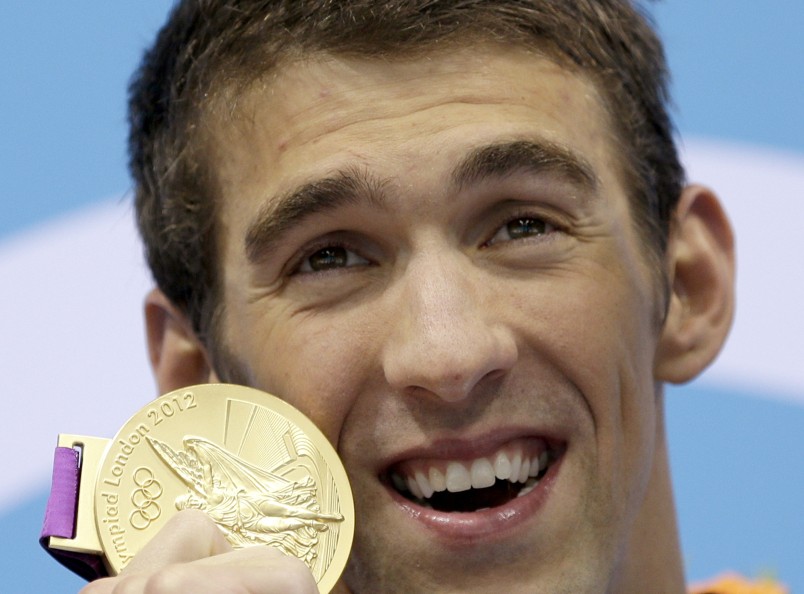Michael Phelps is back for a sequel to his Olympic farewell.
This time, he insists, it really is goodbye.
After retiring and then un-retiring, Phelps will be in Rio as the first U.S. male swimmer to compete in five Olympics. He is already the most decorated athlete in the history of the games, with 18 golds and 22 medals overall, and at age 31 remains the biggest star in a sport that will also feature teen sensation Katie Ledecky and an increasingly diverse pool of potential champions from around the world.
Look for Phelps to add significantly to his medal total. He qualified for his three best individual events and will likely be part of all three men’s relays on the powerful U.S. team.
Just don’t expect another comeback.
“This is it,” Phelps said. “No more.”
Sure about that?
“I’m done,” he reiterated. “The body is done. This is my last one.”
Phelps initially retired after the London Games, only to backtrack on that decision about 18 months later.
Looking back to four years ago, Phelps said he didn’t really want to be at the Olympics and wasn’t in top condition, even though he was still able to capture four golds and two silvers. He came back with a rekindled passion for swimming, only to run into another major challenge when he was arrested for the second time on drunken driving charges.
That led Phelps to completely overhaul his personal life. He went into therapy, gave up alcohol, got engaged, made peace with his estranged father and, biggest of all, became a father for the first time when son Boomer was born in May.
No matter what happens in Rio, this is how he really wants to go out.
Here are some other things to watch at the swimming competition in Rio, which includes open water and synchronized events:
THE KATIE SHOW: Ledecky has gone from a surprise gold medalist in London to one of the world’s most dominant swimmers at age 19. She is the world-record holder and huge favorite in both the 400- and 800-meter freestyle, and could bring home another gold in the 200 free. In addition, she will anchor the 4×200 free relay for the Americans, making them the team to beat.
AUSSIE COMEBACK: Australia has traditionally been the second-strongest swimming nation behind the U.S., but the team from Down Under endured a dismal showing in 2012 with only one gold medal and no individual victories. Look for a big comeback in Rio. The Aussies returned to form at last year’s world championships with seven golds and 16 medals overall. Sisters Cate and Bronte Campbell lead the way, along with Emily Seebohm and Mitch Larkin.
NOT SO BUSY: Missy Franklin was one of the big stars in London, winning four golds and a bronze while competing in seven events. The 21-year-old American will have a lot more free time on her hands this time after a disappointing performance at the U.S. trials.
Franklin qualified for only two individual events and her relay duties will be limited to the 4×200 freestyle. It’s a similar story for another U.S. great, Ryan Lochte. The 11-time Olympic medalist sustained a groin injury on the first day of the U.S. trials and managed to qualify for only one individual race – a far cry from his six events in London.
SHADOW OF DOPING: Gold medalists Sun Yang of China and Park Tae-hwan of South Korea will both swim in Rio after serving suspensions for doping. And Yuliya Efimova, one of Russia’s top medal contenders, was cleared to take part in the Olympics despite her second positive doping test, drawing the ire of many. American Elizabeth Beisel said she is worried the competition in Rio won’t be clean.
HOME TEAM: While Brazil will field its largest swimming squad ever and have the crowd on its side, the home team will be missing its biggest star. World-record holder Cesar Cielo, a three-time Olympic medalist, stunningly failed to qualify at the Brazilian trials. Even so, the local fans should have plenty of reasons to cheer. Established swimmers such as Thiago Pereira, Bruno Fratus and Joana Maranhão are joined by up-and-comers Larissa Oliveira and Etiene Medeiros.
LATE NIGHTS: For the second time in three Olympics, the schedule has been altered so the swimming events can be televised live in the U.S. during prime time. The change isn’t quite as drastic as eight years ago in Beijing, when preliminaries were held in the evening and the finals the following morning. In Rio, the prelims have been moved back to 1 p.m. local time, while the finals won’t begin until 10 p.m. – both about three hours later than most meets.
DIRTY WATER: The 10-kilometer open water races, a part of the Olympics since 2008, will be held against the gorgeous backdrop of Copacabana. The state of the water is not so pretty.
There are major health concerns after Brazilian officials failed to live up to their pledge to clean up an ocean contaminated with raw sewage and potentially dangerous bacteria.
RUSSIANS IN SYNC: Russia’s the favorite in synchronized swimming, a sport known for hair gel, nose plugs, garish suits and dazzling showmanship. The Russians have not been beaten at the Olympics since 1996.
Send questions/comments to the editors.


